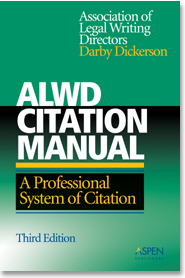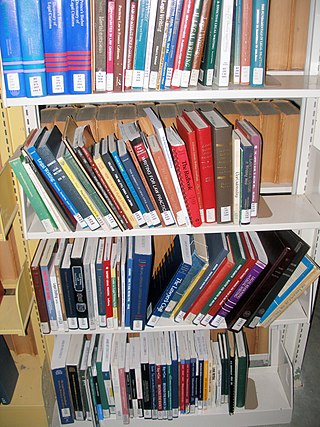And/or is an English grammatical conjunction used to indicate that one or more of the cases it connects may occur. It is used as an inclusive or, because saying "or" in spoken language might be inclusive or exclusive.

The University of Chicago Law School is the law school of the University of Chicago, a private research university in Chicago, Illinois. It employs more than 180 full-time and part-time faculty and hosts more than 600 students in its Juris Doctor program, while also offering the Master of Laws, Master of Studies in Law and Doctor of Juridical Science degrees in law. The law school has the third highest percentage of recent graduates clerking for federal judges after Stanford Law School and Yale Law School.

The Bluebook: A Uniform System of Citation is a style guide that prescribes the most widely used legal citation system in the United States. It is taught and used at a majority of U.S. law schools and is also used in a majority of federal courts. Legal publishers also use several "house" citation styles in their works. The Bluebook is compiled by the Harvard Law Review Association, the Columbia Law Review, the University of Pennsylvania Law Review, and the Yale Law Journal. Currently, it is in its 21st edition. Its name derives from the cover's color.

ALWD Guide to Legal Citation, formerly ALWD Citation Manual, is a style guide providing a legal citation system for the United States, compiled by the Association of Legal Writing Directors. Its first edition was published in 2000, under editor Darby Dickerson. Its sixth edition, under editor Coleen M. Barger, was released in May 2017 by Wolters Kluwer.
Chicago-Kent College of Law is the law school of the Illinois Institute of Technology, a private research university in Chicago, Illinois. It is the second oldest law school in the state of Illinois.

University of Illinois Chicago School of Law is the law school of the University of Illinois Chicago, a public research university in Chicago, Illinois. Founded in 1899, it became affiliated with the university in 2019. The school offers programs for both part-time and full-time students, with both day and night classes available, and offers January enrollment.

Legal writing involves the analysis of fact patterns and presentation of arguments in documents such as legal memoranda and briefs. One form of legal writing involves drafting a balanced analysis of a legal problem or issue. Another form of legal writing is persuasive, and advocates in favor of a legal position. Another form legal writing involves drafting legal instruments, such as contracts and wills.
Robert David Sack is a senior United States circuit judge of the United States Court of Appeals for the Second Circuit.
Ralph L. Brill was Professor of Law at Chicago-Kent College of Law.

Bryan Andrew Garner is an American legal scholar and lexicographer. He has written more than two dozen books about English usage and style such as Garner's Modern English Usage for a general audience, and others for legal professionals. Garner also wrote two books with Justice Antonin Scalia: Making Your Case: The Art of Persuading Judges (2008) and Reading Law: The Interpretation of Legal Texts (2012). He is the founder and president of LawProse Inc.
The Legal Writing Institute (LWI) is a nonprofit organization dedicated to improving legal communication, building the discipline of legal writing, and improving the status of legal writing faculty across the United States. The institute currently has almost 3,000 members; while the bulk of the members are law professors, some of the members are judges, attorneys, and undergraduate professors.
Sentence spacing guidance is provided in many language and style guides. The majority of style guides that use a Latin-derived alphabet as a language base now prescribe or recommend the use of a single space after the concluding punctuation of a sentence.
Douglas Hugh Parker was an American law school professor. He began his law teaching career as a Harry A. Bigelow Teaching Fellow (1952–53) at the University of Chicago Law School and later taught as a professor of law at the University of Colorado College of Law (1953–75) and the Brigham Young University J. Reuben Clark Law School (1975-1991).
Scribes—The American Society of Legal Writers—is an organization dedicated to encouraging legal writers and improving legal writing throughout the entire legal community: in court, in the law office, in the publishing house, and in law school. Founded in 1953, Scribes is the oldest organization of its kind. Scribes has almost 2,700 members, including state and federal judges, practicing lawyers, law-school deans and professors, and legal editors.

The National Law Review is an American law journal, daily legal news website and legal analysis content-aggregating database. In both 2020 and 2021, the National Law Review published over 20,000 legal news articles and experienced an uptick in readership averaging 4.3 million readers in both March and April 2020, due to the demand for news regarding the COVID-19 Pandemic. The site offers hourly legal news updates and analysis of recent court decisions, regulatory changes and legislative actions and includes a combinations of original content and content submitted by various professionals in the legal and business communities. The online version of The National Law Review was started as a research tool by a group of corporate attorneys looking to store and classify useful and reputable legal analysis and news they located on the internet. The National Law Review has grown to one of the most widely read business law websites in the United States.
The Maroonbook is a system of legal citation that is intended to be simpler and more straightforward than the more widely used Bluebook. It was developed at the University of Chicago and is the citation system for the University of Chicago Law Review. As a simplified and modernized citation method, it tends to be closer to the Oxford Standard for Citation of Legal Authorities in its conventions.
Chicago Options Associates (COA) is a finance company in Chicago, Illinois which specializes in trading options and futures contracts. It was founded in 1987 by Oliver R. W. Pergams and Michael E. Davis. In 1994 Davis was its chief executive officer, hiring then-graduate student Jimmy Wales as research director; Wales served in this position until 1998.
Linda L. Berger is an American legal scholar working as an emeritus professor at the William S. Boyd School of Law of the University of Nevada, Las Vegas.






